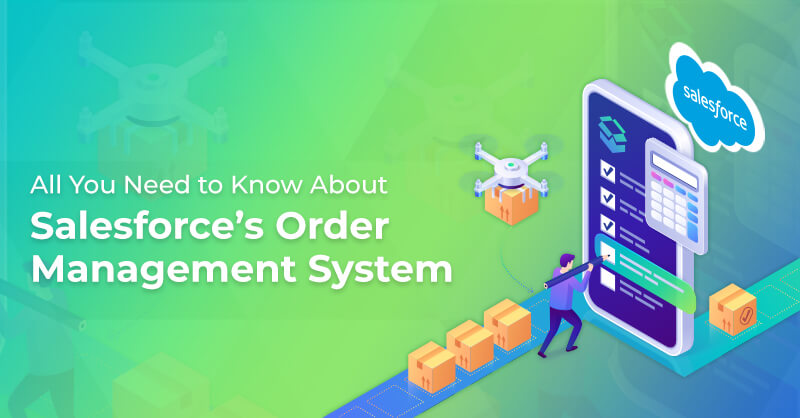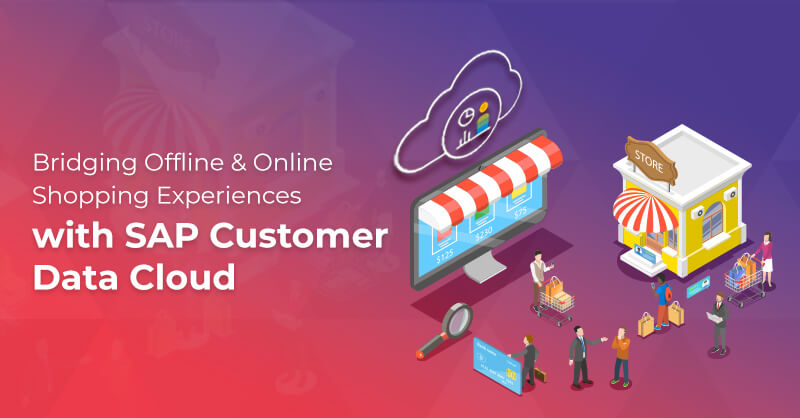Eliminating the Complexity of Integrating Mirakl Marketplace with HCL Commerce
Written by Poonam Chandersy
Technical Content WriterMore than 50% of eCommerce expansion is driven by Marketplace growth. While the online Marketplace business model is 2-3X more profitable than the traditional retail model, it is an entirely different model in which the platform is responsible for facilitating the transaction, showcasing the product and collecting the funds. The marketplace seller is answerable for everything else – setting up prices, uploading images and content, delivery of the goods, liability for the product and customer service. By liberating themselves to a large extent from current eCommerce constraints, Marketplaces guarantee substantial gains for operators, sellers and buyers.
In this blog, we highlight Mirakl Marketplace’s Integration with the HCL Commerce platform, discussing the Marketplace, Mirakl features and benefits, onboarding sellers, product synchronizations, order management, and Royal Cyber’s capabilities and implementation timelines.
Mirakl Marketplace Integration with HCL Commerce
Unifying the buying experience
Owing an online Marketplace is a distinctive opportunity for Retailers & B2B organizations to rapidly expand their product assortment by directly connecting third-party sellers with customers in the market. It’s a low-risk way to expand offers, without needing to buy, store, and ship products.

What is a Marketplace?
The traditional retail model has been around for a while, in which the supplier sends goods from their distribution center directly to the customer. The retailer who sells the product is liable for the product and is also responsible for setting up retail prices, maintaining content, images, processing refunds and all other tasks related to customer service.
The Marketplace is an entirely different model in which the Marketplace platform is only responsible for facilitating the transaction, showcasing the product and collecting the funds. The marketplace seller is answerable for everything else – setting up prices, uploading images and content, delivery of the goods, liability for the product and customer service. By liberating themselves to a large extent from current eCommerce constraints, Marketplaces guarantee substantial gains for operators, sellers & buyer.
Mirakl Catalog Manager
In a Marketplace, integrating catalogs is a complex task, it includes:
- For one single product, you can have multiple content sources coming from different sellers and from your own catalog team.
- Those sources can be in different catalog formats as there is no single way to describe a product.
- You have to deal with large volumes, like receiving millions of products updates every day.
- In order to scale, you want to delegate as much as possible work to your sellers.
Mirakl Catalog Manager has been specifically designed to remove the complexity of integrating catalogs from multiple sources
MCI Catalog Management in Mirakl
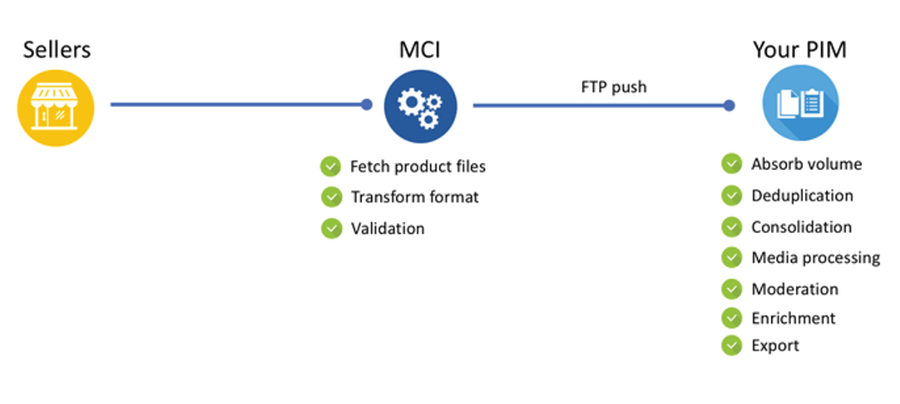
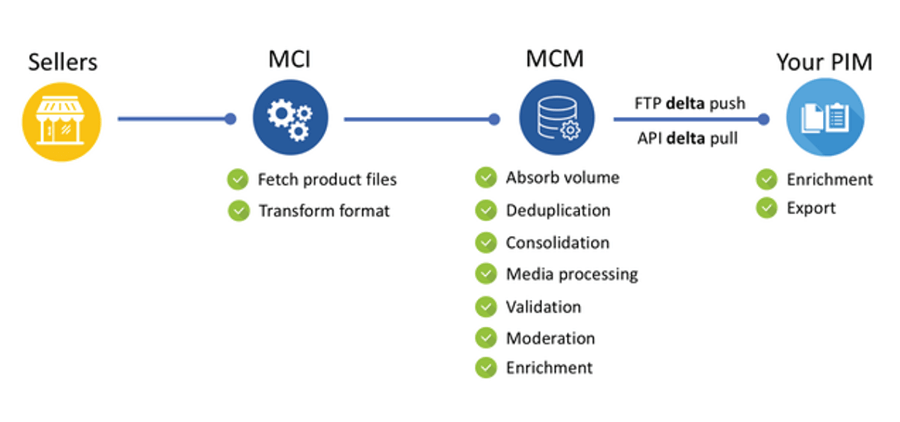
- Benefits of Using Mirakl Catalog Manager
- Absorb volumes & expose only products that have changed thanks to a delta export API
- Allow providers to browse their catalog, enrich and fix product data in their back office
- Avoid duplicated products on your storefront
- Get the most of multiple content sources from your providers
- Easily decide which products you want to sell and which you do not
- Mirakl is a marketplace SaaS solution that helps you absorb millions of products & offers without straining your own SI architecture
- Easy to use Marketplace Operators and Seller Portals
- Mirakl is fully REST API-based & can connect & feed info to any commerce, any app or any tech
- Features of the Mirakl Catalog Manager
- View products (list and details page)
- Edit Master Product Data Sheets
- Edit Source Product Data Sheets
- Manage catalogs
- Assign catalogs to products
- Manage rejection reasons
- Accept and reject products
- Delete products
- Configure provider score
HCL Commerce Integration with Mirakl Marketplace platform
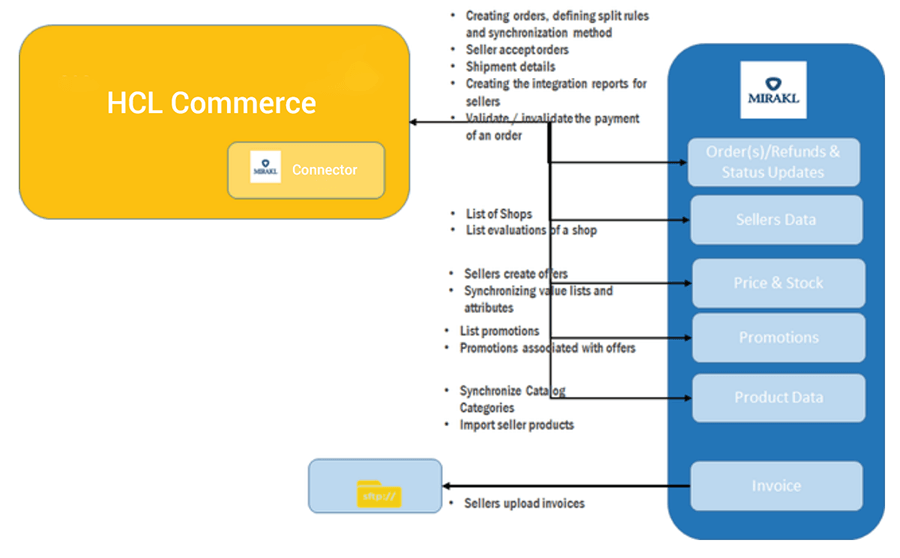
On-boarding Sellers
- Sellers upload the prerequisite documents for registration on the Mirakl system.
- Seller accounts are created either by invite or by email (navigating via the link provided in email) or directly using Mirakl back-office interface.
- Sellers configure shipping charges including the shipping methods and prices for the associated store on Mirakl Marketplace platform after registration.
- Mirakl connector will be deployed on the HCL Commerce Storefront, and the seller information is synchronized from the Mirakl system by executing the MiraklImportShopsCronjob job provided by the connector’s API’s S20 & S03.
Synchronizing Products
- Mirakl Catalog Manager connector will be deployed on the HCL Commerce Platform, and Product catalog categories will be synchronized with the Mirakl platform by executing the MiraklExportCatalogCronJob job provided by the connector that uses Mirakl’s API H01, H02 & H03.
- Sellers can import/create products and variants in the Mirakl system with the template based on the HCL Commerce Platform product format.
- Synchronization process will map products and variants to the HCL Commerce Platform product format within the Mirakl system.
- Seller will map the price, available stock and shipping charge details to imported/created products in Mirakl system.
- By executing the MiraklProductImportCronJob provided by the connector synchronize the products from the Mirakl system to the HCL Commerce Platform PIM system. It, in turn, uses Mirakl API’s CM21, CM22, and CM23.
- The connector product synchronization cron job will be scheduled to synchronize the day-to-day product data modifications on the hourly/daily basis as per the businesses requirement.
- Solr re-indexed to include marketplace products.
- Offers created in Mirakl system by the seller and are synchronized using the connector MiraklImportPromotionsCronJob job with HCL Commerce storefront.
Managing Orders
- Leverage HCL Commerce Storefront checkout process to accommodate marketplace products to place orders.
- The Cart is validated for the marketplace products differentiated using the marketplace attribute associated with the product.
- Based on the product in the cart, an order will be placed as detailed below:
- Cart with marketplace products associated with one seller, an order will be created in both HCL Commerce Platform and Mirakl systems with the help of Mirakl connector that uses API’s OR01, OR02, OR03, and OR21 & OR11.
- Cart with marketplace products associated with multiple sellers, one order will be created in HCL Commerce Platform and multiple orders (each seller one order) in Mirakl systems with the help of Mirakl connector that uses API’s OR01, OR02, OR03, and OR21 & OR11. Mirakl connector contains the order split strategy for placing multiple seller orders in the Mirakl system.
- Orders with Marketplace products, payment is realized using an integrated HCL Commerce Platform payment gateway.
- Order status updates from Mirakl system will be synchronized with HCL Commerce Platform by Mirakl connector which uses API’s OR11 & OR21.
- An invoice will be generated from the Mirakl system and places under the configured SFTP folder using API OR74.
Conclusion
With extensive experience in integrating the Mirakl marketplace, Royal Cyber’s implementation includes eCommerce platform integration with Mirakl, Sterling OMS integration, connecting sellers with Mirakl, adding features to customer journey such as Multi-Offers, Buy Box, eCommerce UI changes amongst others. Usually, it takes 3-4 months to seamlessly integrate Mirakl with HCL Commerce, however the timelines also depend and vary based on the requirements and complexities of the customizations involved. Contact us today to learn more about how we can help with your Mirakl Marketplace platform integration.

